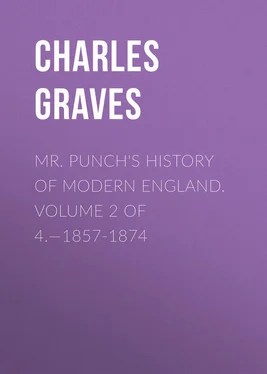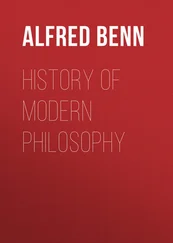Charles Graves - Mr. Punch's History of Modern England. Volume 2 of 4.—1857-1874
Здесь есть возможность читать онлайн «Charles Graves - Mr. Punch's History of Modern England. Volume 2 of 4.—1857-1874» — ознакомительный отрывок электронной книги совершенно бесплатно, а после прочтения отрывка купить полную версию. В некоторых случаях можно слушать аудио, скачать через торрент в формате fb2 и присутствует краткое содержание. ISBN: , Издательство: Иностранный паблик, Жанр: foreign_prose, foreign_humor, на английском языке. Описание произведения, (предисловие) а так же отзывы посетителей доступны на портале библиотеки ЛибКат.
- Название:Mr. Punch's History of Modern England. Volume 2 of 4.—1857-1874
- Автор:
- Издательство:Иностранный паблик
- Жанр:
- Год:неизвестен
- ISBN:http://www.gutenberg.org/ebooks/45003
- Рейтинг книги:4 / 5. Голосов: 1
-
Избранное:Добавить в избранное
- Отзывы:
-
Ваша оценка:
- 80
- 1
- 2
- 3
- 4
- 5
Mr. Punch's History of Modern England. Volume 2 of 4.—1857-1874: краткое содержание, описание и аннотация
Предлагаем к чтению аннотацию, описание, краткое содержание или предисловие (зависит от того, что написал сам автор книги «Mr. Punch's History of Modern England. Volume 2 of 4.—1857-1874»). Если вы не нашли необходимую информацию о книге — напишите в комментариях, мы постараемся отыскать её.
Mr. Punch's History of Modern England. Volume 2 of 4.—1857-1874 — читать онлайн ознакомительный отрывок
Ниже представлен текст книги, разбитый по страницам. Система сохранения места последней прочитанной страницы, позволяет с удобством читать онлайн бесплатно книгу «Mr. Punch's History of Modern England. Volume 2 of 4.—1857-1874», без необходимости каждый раз заново искать на чём Вы остановились. Поставьте закладку, и сможете в любой момент перейти на страницу, на которой закончили чтение.
Интервал:
Закладка:
The present is the most extravagant government that ever existed in peace time.
This is all Lord Palmerston's fault.
He is always interfering and getting up sensations.
If the Liberals do not disentangle themselves from this system they will "rot out of existence."
The Tories keep Lord Palmerston in Office and have more confidence in him than in their own chief.
He is puffed by a clever and noisy claque .
All the questions dear to Radicals and Dissenters have gone back under his leadership.
This sort of thing must not go on next year.
Our Noble Selves
The honours of the debate, which did not enhance Cobden's reputation, rested with Palmerston, but apart from his extreme frankness in dealing with the Lancashire mill-owners, he owed his triumph to his unrivalled Parliamentary opportunism. The Governments of neutral states cannot play heroic rôles in a great war. More scope is left to opposition leaders. Lord Derby distinguished himself by his liberality and energy in organizing relief measures, but the Lancashire working man was the most heroic figure in English public life from 1861 to 1865, though Punch had only a glimmering of the truth. The note of complacent satisfaction over the tranquillity and prosperity of England as compared with the disturbed state of Europe is frequently sounded, and the Exhibition of 1862 is taken as the occasion to blow the national trumpet in "Our Noble Selves": —
All the world we invite to behold a grand sight
Of not only goods, chattels, and treasures,
But of law that's obeyed because mended or made
By men who bring forward good measures.
Let them come then, and see what a people are we,
Steady-going, not headlong and skittish.
What a world this of ours would be, O foreign Powers,
If all nations behaved like the British!
This is Liberty Hall; no restriction at all
On the freedom of speaking and writing;
The result is that, say any fool what he may,
Foolish language occasions no fighting.
'Tis the easiest job to disperse any mob,
Without being so much as pumped on
By a fire-engine hose, off the multitude goes,
Mind, Order reigns bloodless at Brompton.
This mood is, however, tempered by moments of self-criticism. The social millennium had not arrived when in 1862 a statue was erected in Bolton to its benefactor Crompton, the inventor of the spinning-mule, while his descendants were living in destitution: —
The spinning mule made Bolton. Samuel Crompton made the spinning mule… He died in 1827, at the age of 74, and now Bolton, whose master-manufacturers cheated him living, honours him dead with a statue… But Samuel Crompton left more behind him than the great invention and the memory of his wrongs and struggles. He begat sons and daughters as well as invented mules. He died a pauper, and they have fared as the children of those who die paupers are apt to do… One of his sons is living dependent on charity, as his father died. Somebody bought him a suit of clothes that he might make a decent appearance at the inauguration of his father's statue. Besides this son, there are living some half a dozen grandchildren, some dozen great-grandchildren, of the inventor – all, with one exception, in poverty of the meanest, most pinching kind. Not one of them, son, grandchildren, or great-grandchildren, was invited to the inauguration of Samuel Crompton's statue.
London Arab: "Please, sir, can't I have a shill'n's 'orth?]
A sum of £2,000 had been collected for the statue: a few weeks after its inauguration Lord Palmerston sent £50 to the surviving son. Assuredly there have been few more remarkable examples of asking for bread and being given a stone. And mill-owners were not the only masters whose methods exposed them to criticism. When in 1863 the engine-driver and fireman of a luggage train were fined 15s. each at the Oxford City Court for being found drunk and incapable on their engine, Punch admits the moderation of the punishment, but asks his readers to ponder the story told by the delinquents, and put the saddle on the right horse: —
They declared in the presence of the Company's Officers and without contradiction, that their day was fourteen hours, and that owing to extra pressure, they had only had seventeen hours sleep the whole of last week… On whom should fall the blame and punishment? On the men, outworn, and driven to stimulants as a substitute for sleep or a support under exhaustion, or on the managers of the Company, who thus overwork, or, in other words, underpay their servants?
Overworked Pointsman (puzzled): "Let's see! There's the 'scursion' were due at 4.45, and it ain't in; then, afore that were the 'mineral' – no! that must ha' been the 'goods,' or the 'cattle.' No! that were after – cattle's shunting now. Let's see. Fast train came through at – con-found! – and here comes 'the express' afore its time, and blest if I know which line she's on!
The cartoon published nine years later, in 1872, showed that Punch was still dissatisfied with the conditions of railway servants. A propos of the railways, it is worth recording that in 1860 there were cheap excursions to Brighton and back for 3s. Also that in 1868 Punch commits himself to the view that an increase in railway fares means less revenue – an interesting parallel to the recent controversy.
In 1865 the cattle plague led to a sharp rise in the price of meat; but the attempt to introduce and popularize cheap jerked (or charqued) beef from South America – sold at threepence a pound – was not successful, though Punch appealed to the public to give it a fair chance in a set of verses with the refrain: —
Oh, the jerked beef of La Plata,
A platter give me of jerked beef.
"Progress at high prices," in Punch's opinion, was dearly bought. When two demonstrations were held by working men at Worcester this summer to protest against the high price of meat which was attributed to a monopoly amongst the farmers and butchers, and a resolution was adopted to abstain from the consumption of meat for a certain time, Punch saw in this move a tacit acknowledgment that the high price was owing to demand, and cordially endorsed the comments of The Times : —
There can be no doubt that the present high price of meat is mainly to be traced to the fact that the consumption on the part of the working classes has of late years enormously increased, owing to their prosperous condition, good wages, and cheap bread. A general resolution on their part to limit the consumption would soon bring down the price.
Honest Fault-finding
The strike against the butchers was one in which the working classes might safely combine to turn out. "They will not injure themselves, nor hurt their wives and families: on the contrary, all the while the strike lasts they will be putting by money. The public will support instead of discouraging them." But it is impossible to take the commendation seriously in view of the last sentence; "whilst others, I trust, are endeavouring, by total abstinence from butchers' meat, to reduce the butchers to reason, I remain medicinally, of course, always 'A Beefeater.'" Much more effective, because untainted by irony, are the plain-spoken verses on the British workman as painted by his flatterers, his detractors and his candid friends: —
While Democrat orators praise him and puff him
As the land's bone and sinew, and Nature's own nob:
Aristocrat talkers calumniously cuff him,
As shiftless, and soulless, sot, spendthrift, and snob.
'Twixt the daub of his bully, the daub of his backer,
The true British Workman's been able to stand,
And at once to disclaim both the brighter and blacker,
As alike wide of truth, from the right and left hand.
Интервал:
Закладка:
Похожие книги на «Mr. Punch's History of Modern England. Volume 2 of 4.—1857-1874»
Представляем Вашему вниманию похожие книги на «Mr. Punch's History of Modern England. Volume 2 of 4.—1857-1874» списком для выбора. Мы отобрали схожую по названию и смыслу литературу в надежде предоставить читателям больше вариантов отыскать новые, интересные, ещё непрочитанные произведения.
Обсуждение, отзывы о книге «Mr. Punch's History of Modern England. Volume 2 of 4.—1857-1874» и просто собственные мнения читателей. Оставьте ваши комментарии, напишите, что Вы думаете о произведении, его смысле или главных героях. Укажите что конкретно понравилось, а что нет, и почему Вы так считаете.












